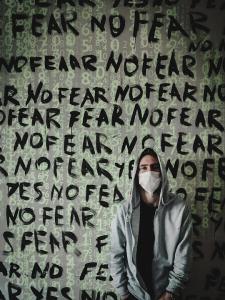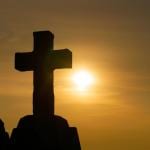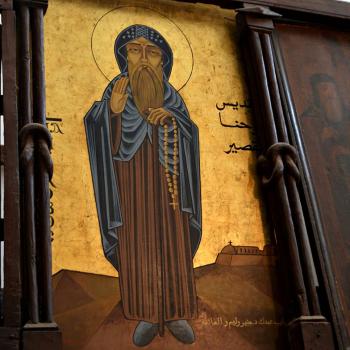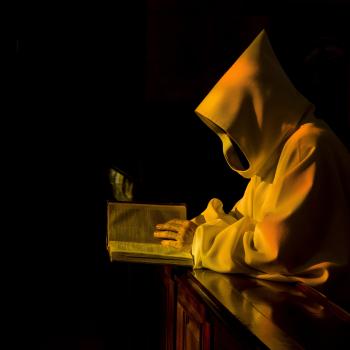
Jesus told us not to be afraid. We should not look out to the world in fear; we should not be overly worried about those who unjustly threaten to do us some harm if we don’t follow them in their wicked ways, because, though we might indeed suffer, they are limited in what they can do to us and eventually their power will come to an end But he also told us to fear the one who can destroy our soul: “And do not fear those who kill the body but cannot kill the soul; rather fear him who can destroy both soul and body in hell” (Matt. 10:28 RSV). Who is it that threatens our soul? We are. So long as we become attached to ourselves, to our particular wants and desires apart from the dictates of God, we turn away from God, from grace, and find ourselves perishing in our sins.
God loves us and wants to give us everything, that is, the kingdom of God. “Fear not, little flock, for it is your Father’s good pleasure to give you the kingdom” (Lk. 12:32 RSV). And so, when we find ourselves blessed by Jesus, when we are given his peace, we find ourselves experiencing the kingdom of God; and because we experience the kingdom of God, we find all fear is taken away from us. “Peace I leave with you; my peace I give to you; not as the world gives do I give to you. Let not your hearts be troubled, neither let them be afraid” (Jn. 14:27 RSV). The blessings come as we overcome ourselves, and so the more we die to the self, the more we find ourselves experiencing the vitality of the kingdom of God and so find all fear taken away from us.
We should not be afraid. But that does not mean we should be foolish. We are to be wise as serpents (cf. Matt. 10:16). We should be concerned with what we do, making sure what we do is right and just. “Look carefully then how you walk, not as unwise men but as wise” (Eph. 5:15 RSV). Acting out of wisdom, doing what wisdom suggests us to do, does not mean we are afraid. It means we love justice and will act according to its dictates, which means, looking after our own welfare, but also the welfare of our neighbor, so that we do not take unnecessary and foolish risks. “Who is wise and understanding among you? By his good life let him show his works in the meekness of wisdom” (Jas. 3:13 RSV).
Those who are wise know they do not have to pretend to be brave in front of others. They do not have to show off, risking their lives to prove they are not cowards. Acting wisely, taking care of our lives, and the lives of others is not an act of fear, but rather, an act of love, and love banishes fear. We are not to be afraid, but we are not to be reckless. Jesus himself was known to hide from those seeking him and his death; he acted in wisdom, making sure that he was not taken in by the authorities before the proper time. He was not afraid, but he also was not foolish.
We are not to be afraid, but we are not to be nonchalant and risk our lives, because our lives are not our own. We belong to God—and to each other – and what we do should be done to honor God and each other. We should act in such a way as to take care of our neighbor; if showing off and acting bravely puts others into needless risks, we show ourselves to be foolish, and far from the bravery God intends us to have. For really, it is such actions which show we are afraid, afraid of what others think concerning us; by trying to act fearless, we prove we are the ones with irrational fear.
Abba Nisterus the Great understood this; he was not afraid, for he walked with God and knew God was with him. But he also knew that in his walk with God, he should not act out of vainglory:
Abba Nisterus the Great was walking in the desert with a brother. They saw a dragon and they ran away. The brother said to him, ‘Were you frightened too, Father?’ The old man said to him, ‘I am not afraid, my child, but it is better for me to flee, so as not to have to flee from the spirit of vain-glory.’[1]
Those who seek the recognition of others fear what others think of them. For the sake of vainglory, they will do foolish things, because they are afraid that others will think less of them if they do not. But those who have seen through vainglory, those who are not concerned about their reputation, that is, those who act with wisdom, might act in such a way as if they were afraid, such as we see in the story of Nisterus who ran away from a “dragon.” Nisterus knew he should not put on the appearance of bravery and foolishly perish, for then he would have been negligent in taking care of the talent which God had given to him, that is, his life.
One does not have to show off to prove one is not afraid of death; one does not have to do extreme actions to prove one’s bravery. Those who would decry the simple promptings of wisdom and call actions done out of wisdom, cowardly, only project their own fear upon others. They do this to hide their own fear from themselves. They are afraid of appearing to be afraid. Thus, those who mock people for wearing masks during a pandemic as being afraid only prove they are the ones who are afraid, while those who follow wisdom will wear a mask, knowing it is just and right to do so.
Truly, we should not be afraid. While we should not be afraid of death, we should not hasten it foolishly. We are to be stewards of the life which we have been given, to take care of it and not recklessly throw it away. We must not risk our lives to prove we are not afraid. We must engage wisdom and in doing so, show we are concerned not just about ourselves, but about the welfare of others as well. If we are reckless in our actions, we risk not only our own lives but the lives of others, and if others dies through our own actions, directly or indirectly, we will be held accountable for those deaths. Vainglory makes us act in a way which we think will make us look great to others, but it will also have us act in poorly, ignoring the prompting of wisdom, and so it will lead us astray. Eventually whatever repute we might have gained will be lost, as fame is fleeting, but the consequences of our actions will stay with us throughout the rest of our lives (and follow us to the afterlife, when we shall be judged for what we have done).
[1] The Sayings of the Desert Fathers. Trans. Benedicta Ward (Kalamazoo, MI: Cistercian Publications, 1984), 154 [Nisterus Sayings 1]
Stay in touch! Like A Little Bit of Nothing on Facebook.
If you liked what you read, please consider sharing it with your friends and family!













